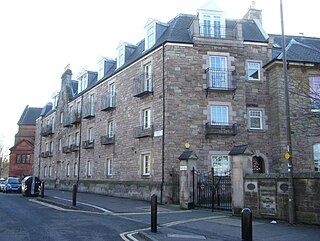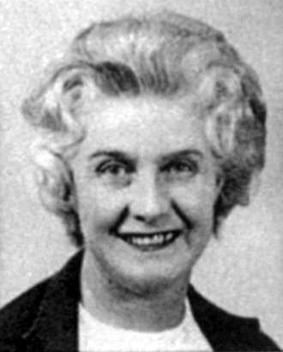
Eliza Maud "Elsie" Inglis was a Scottish medical doctor, surgeon, teacher, suffragist, and founder of the Scottish Women's Hospitals. She was the first woman to hold the Serbian Order of the White Eagle.

Bruntsfield Hospital was a women's hospital based in the Bruntsfield area of Edinburgh, Scotland.

Margaret Georgina Todd was a Scottish medical doctor and writer. She coined the term isotope in 1913 in a suggestion to chemist Frederick Soddy.

Agnes McLaren FRCPI was a Scottish doctor who was one of the first to give medical assistance to women in India who, because of custom, were unable to access medical help from male doctors. Agnes was active in social justice causes including protests against the white slave trade. She signed the 1866 women's suffrage petition and was secretary of the Edinburgh National Society for Women's Suffrage alongside her stepmother, Priscilla Bright McLaren. In 1873 she travelled with Priscilla and Jane Taylour to give suffrage lectures in Orkney and Shetland. Her father had supported the campaign of first women who sought to study medicine at University of Edinburgh and Agnes became friends with Sophia Jex-Blake, one of the Edinburgh Seven. Her father did not however, support Agnes' own ambitions in this area. And as she could not graduate in medicine in Scotland, she went to study in France and later, in order to be permitted to practice at home, became a member of the Royal College of Dublin.

Marion Gilchrist was the first female graduate of the University of Glasgow, one of the first two women to qualify in medicine from a Scottish university; and a leading activist in the Women's suffrage Movement in Scotland. In recognition of her achievements she has been honoured in a number of ways.

Ethel Agnes Mary Moorhead was a British suffragette and painter and was the first suffragette in Scotland to be forcibly-fed.

The Scottish Women's Hospitals for Foreign Services (SWH) was founded in 1914. It was led by Dr Elsie Inglis and provided nurses, doctors, ambulance drivers, cooks and orderlies. By the end of World War I, 14 medical units had been outfitted and sent to serve in Corsica, France, Malta, Romania, Russia, Salonika and Serbia.

Wilhelmina Hay Abbott, also known by the name "Elizabeth Abbott," was a Scottish suffragist, editor, and feminist lecturer, and wife of author George Frederick Abbott.

Anna Blount was an American physician from Chicago, and Oak Park. She was awarded Doctor of Medicine June 17, 1897 by Northwestern University. She volunteered her medical services at Hull House, a settlement house in Chicago that was founded in 1889. She encouraged other women to become physicians and was the president of the National Medical Women's Association.

The Glasgow and West of Scotland Association for Women’s Suffrage was an organisation involved in campaigning for women’s suffrage, based in Glasgow, with members from all over the west of Scotland.

Maud Perry Menzies O.St.J. was a Scottish physician who specialised in community medicine. She introduced significant improvements to public health care in Glasgow.
Margaret Williamson Menzies Campbell FDS FRCSE was a Scottish surgeon and general practitioner, who is known for her work as an historian of women's medical education and practice and dentistry.

Dr Elspeth King is a Scottish curator, writer and social historian. She is known for her role as curator of social history at the People's Palace Museum in Glasgow, as Director the Stirling Smith Art Gallery and Museum, and for her scholarship on the Scottish Suffrage movement.
Dr Alice McLaren was a Scottish medical doctor, gynecologist, suffragist and advocate for women's health and women's rights. She was the first woman medical practitioner in Glasgow.

Ellison Scotland Gibb was a Scottish suffragette and chess player. She was an active member of the Women's Social and Political Union. In 1910, she was appointed as the honorary secretary of the Actresses' Franchise League in Glasgow. She was arrested and imprisoned on several occasions for her militant activity, and confronted both Churchill and Asquith to make the suffrage case. Her chess career included winning the Scottish Ladies Championship in 1907. and acting as President of the Glasgow Ladies Chess Club from 1921
Jessie Cunningham Methven was a Scottish campaigner for women's suffrage. She was honorary secretary of the Edinburgh National Society for Women's Suffrage from the mid 1890s until 1906. In that role, She corresponded regularly with national and local newspapers across Scotland on the subject of women's suffrage. She subsequently joined the more militant Women's Social and Political Union and described herself as an "independent socialist". Methven took part in suffragette protests and was arrested for breaking windows in London in 1911. She wrote an article for The Suffragette newspaper, the weekly newspaper of the WSPU, entitled Women's Suffrage in the Past, A Record of Betrayal which reflected on the history of the women's suffrage movement in Britain.
Dr Alice Margaret Moorhead MD LRCP LRCSE LM (Dub), also known as Dr A.M. Moorhead, was one of the first practising female physicians and surgeons in Scotland. In the late 19th century she established a practice and hospital for women in Dundee with her colleague Dr Emily Thomson.

Alice Lilian Louise Robson was a Scottish medical doctor and one of the first two women to be awarded a medical degree in Scotland.

Eleanor Soltau (1877–1962) was an English doctor who led the first unit of the Scottish Women's Hospitals for Foreign Service in Serbia.
Mary Lauchline McNeill was a Scottish suffragist and Orcadian doctor, who served with the Scottish Women's Hospitals in World War One, awarded medals from Britain, France and Serbia, then worked in medicine in Palestine, India and Uganda, where she died of typhoid.
















